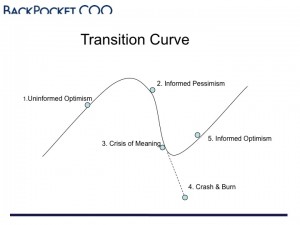The motivation during your PhD is not constant, and it resembles the phases that entrepreneurs experience and that Tim Ferriss describes in his post Harnessing Entrepreneurial Manic Depression: Making The Rollercoaster Work for You. Tim provides great advice for entrepreneurs, but this can easily be adapted to research and PhD life.
This curve is fitted to PhD data collected during many years. This means everybody will experience a certain deviation from the values here predicted. Some phases will be mild while others can be extreme. At any stage, don’t be carried away by over-optimism/pessimism. Stay cool, be water my friend.
Phase 1: Uninformed optimism
You start your PhD, everything is new and you find your project really cool. It feels like you are going to solve a big problem and you might get a big prize if you are ambitious and work well, maybe a patent, maybe a paper in a high impact journal. Sounds familiar? It is a similar feeling to starting in a new job, everybody is nicer than in the previous job and it is by far better organized. Well, give it some months, you’ll realize it is not that great.Phase 2: Informed Pessimism
You have been working for some time on your project, you understand the field better, but unfortunately you are still lost. You don’t see any good results in the near future and you start to realize that this project might be a bit too big for you. This phase is more severe if the content of your PhD is not a continuation from a previous work, if you switched fields.Phase 3: Crisis of Meaning
You are more or less in the middle of your PhD and you have a crisis like 40 year old guys have. Since you don’t have money to buy you a Porsche, you just cry in silence in a corner. You think “Is this all? Am I a failure?” The project is not as pinkful as you dreamt it, in fact, you are going to struggle and work your ass off to finish a minimally decent body of work. You feel that you have wasted a lot of time, that you did a lot of useless little projects. Now they seem useless, but you never know, maybe sometime later you connect the dots and they were the starting points of something great.Phase 4: Crash and Burn (optional)
While at Phase 3, if you don’t step aside fast from your negative feelings you are going to be screwed. Negativity might take over, leading you a mini depression. At this stage, many people think they have been wasting their time and they give up. They walk away with an unfinished PhD. Needless to say, we want to avoid this.Phase 5: Informed Optimism
Slowly you start to realize that your PhD thesis is not going to be as awesome as you thought. Whatever. At least you’ll get some publications, enough to graduate. Maybe the Nature paper has to wait for your post-doc. Who cares. You’d better finish a half-ass Phd than nothing. You are getting the grip of your field, you can contribute (something) to the state of the art. It should be enough. Good enough, you don’t need perfect.This curve is fitted to PhD data collected during many years. This means everybody will experience a certain deviation from the values here predicted. Some phases will be mild while others can be extreme. At any stage, don’t be carried away by over-optimism/pessimism. Stay cool, be water my friend.
UPDATED: Check the Next Scientist
I have started a new blog to help PhD students and young scientist to do better science, get exposure and grow their academic footprint. All using digital hacks, blogging and social media. Check these blog posts, I think you might find them interesting:- Grow Your Academic Footprint With A Science Blog: A Free Videotutorial, our video guide that helps you to set up your own science blog.
- 7 habits of highly visible PhD students, it includes some tips on social media and blogging.
- 3 Questions You Should Ask Your PhD Supervisor Before Choosing A Career In Science?, a reality check before jumping on an academic career.
- 10 Things You Should Know Before Starting a PhD, with all those dirty secrets nobody is going to tell you.
- A statement of purpose for graduate school, the letter I was submitting when I searched for PhDs.
- We have other posts on science blogging and social media for scientists.

Tidak ada komentar:
Posting Komentar